Various federal agencies provide funding to small businesses to conduct research and development with the goal of commercializing technology. This federal funding occurs via two different award mechanisms:
- Small Business Innovation Research (“SBIR”)
- Small Business Technology Transfer (“STTR”)
Both SBIR and STTR awards are made directly to a small business concern (“SBC”). A SBC is a for-profit company that is the applicant for a SBIR/STTR award. In this section of the guidance, we use the terms SBC and company interchangeably.
STTRs require that the SBC collaborate with a research institution (“RI”) for a certain portion of the award. SBIRs do not require RI involvement, but SBCs often collaborate with RIs on SBIRs. A RI is the research institution partner, such as UConn, that collaborates with an SBC for a SBIR/STTR award through a subcontract/subaward under the SBC.
UConn meets the criteria to serve as a RI for SBIRs and STTRs. UConn’s involvement in either a SBIR or a STTR occurs when it is either included in the proposal or the federal sponsor has provided approval to SBC to engage with the university and is awarded via a subcontract/subaward from the SBC to the university. In cases where there is a collaboration/subcontract/subaward between the SBC and the RI, there is an SBC PI and an RI PI (i.e. a PI for each side of the collaboration).
Requirements for SBIRs and STTRs
SBIR
| Applicability | Eligibility Requirements |
| SBC | Must be an American-owned business
Must be independently operated Must be a for-profit business Must have five hundred or fewer employees If sub-contract with another party, or with multiple parties: SBC must do at least two-thirds of research during Phase I; SBC must do at least one-half of research during Phase II |
| SBC PI | Must be primarily employed with SBC |
| RI | Involvement of RI not required
If the SBC subcontracts with RI: RI may conduct up to one-third of research during Phase I; RI may do up to one-half of research during Phase II |
STTR
| Applicability | Eligibility Requirements |
| SBC | Must be an American-owned business
Must be independently operated Must be a for-profit business Must have five hundred or fewer employees Not less than 40% of the research/research development must be performed by SBC |
| SBC PI | Must be primarily employed by either the SBC or the collaborating RI |
| RI | Research Institution collaborator required
Must be one of the following: A non-profit college or university; A domestic non-profit research organization; or A federally funded Research and Development Center RI required to conduct at least 30% of research and development but may conduct up to 60% of research and development |
SBC Use of University Space
Small businesses certify in their SBIR and STTR applications and award documents to the federal government that the SBC research and development will occur in SBC facilities using company employees unless otherwise indicated in the SBIR or STTR application and approved in the funding agreement. Therefore, performing the SBC portion of such research in University space using University resources — unless specifically approved by the funding agency and allowed by the University – subjects the company to potential criminal, civil, or administrative sanctions.
Consulting for a Faculty Affiliated Company
As a general rule, if the faculty affiliated company is sponsoring research at UConn under an SBIR or STTR, the faculty member should not be paid as a consultant under the award.
The Same Individual Serving as University PI and SBC PI
For SBIR awards, the SBC PI must be primarily employed by the company. Most faculty members are fully employed by UConn and therefore cannot serve as the PI for an SBC. To serve as PI for a SBC, the faculty member cannot have a University position or appointment of greater than 49%.
For STTR awards, the PI named on the award may be primarily employed by either the company or the University. The exception is for NSF STTR awards, in which the PI named on the award must be primarily employed by the SBC.
For the work conducted for both SBIR and STTR awards, the SBC PI and the RI PI may not be the same individual. While not explicitly stated, the STTR/SBIR policy, instructions, and project percentage requirements make clear that establishing a separation of entities and roles is important. Having the same person on both sides of the collaboration blurs the respective parties’ project roles, responsibilities and effort/time commitments.
Specific sponsor policies or requirements may differ and be more restrictive. For example, the NSF guidance states that no person who is an equity holder, employee, or officer of the proposing small business may (1) be paid as a consultant, or (2) be paid through a subaward budget, in either case, unless recommended and approved by the NSF.
Faculty members that have an interest in an SBC must read all sponsor requirements for SBIR/STTR proposals and awards carefully and note what situations may be prohibited or that may require advance sponsor approval. It is strongly recommended that the SBC engage counsel to review and advice on the grant awards, and hire accountants with specific expertise in SBIRs and STTRs.
Management of Faculty Affiliated Company Grants
The faculty affiliated company/external entity is responsible for all grant administration relating to company grants, including SBIR and STTR grants. The faculty affiliated company/external entity should seek professional advice on appropriate grant management and administration.
Federal and Sponsor Specific Guidance
The US Small Business Administration provides guidance to small businesses wishing to pursue SBIR or STTR funding opportunities. Their website includes general information as well as links to individual federal sponsor programs. Sponsors may have additional guidelines or restrictions and those small businesses seeking to pursue a SBIR or STTR project should be careful to thoroughly review guidelines and restrictions.
